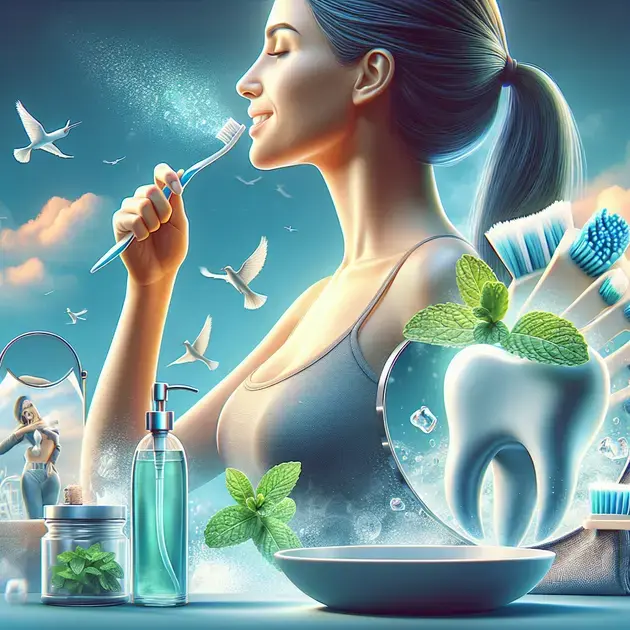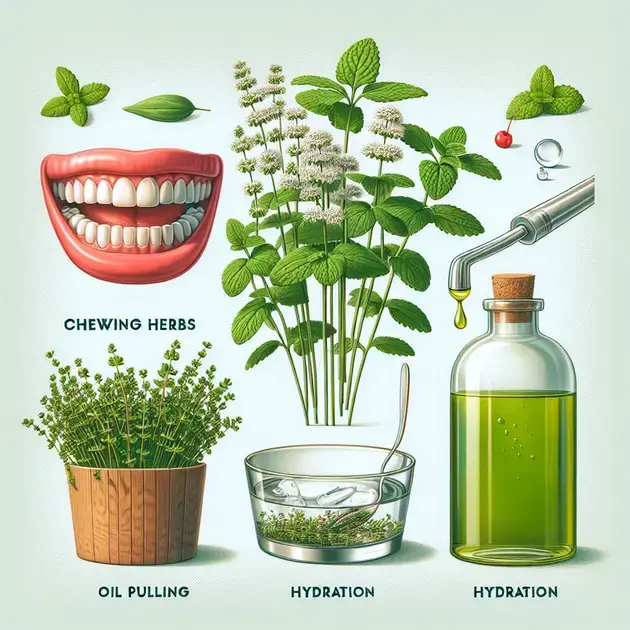Are you struggling with bad breath and looking for effective solutions? You’re not alone. Halitosis, commonly known as bad breath, affects a large percentage of the population and can be a source of embarrassment and self-consciousness.
Fortunately, there are several simple yet powerful remedies that you can try today to combat bad breath and regain your confidence. From proper oral hygiene practices to natural breath fresheners, it’s possible to tackle this common issue and enjoy a renewed sense of freshness throughout the day.

**
Practical Tips to Combat Bad Breath**
Bad breath, also known as halitosis, can be a source of embarrassment and discomfort for many individuals. Fortunately, there are practical tips that can help combat bad breath and promote fresher breath throughout the day. One effective strategy is to maintain good oral hygiene practices, such as brushing your teeth at least twice a day and flossing regularly. Additionally, using a tongue scraper to remove bacteria buildup on the surface of the tongue can also help reduce bad breath.
Another tip to combat bad breath is to stay hydrated by drinking plenty of water throughout the day. Saliva helps wash away bacteria in the mouth, so staying hydrated can promote saliva production and reduce the risk of bad breath. Avoiding foods with strong odors, such as garlic and onions, can also help minimize bad breath.
Step-by-step Guide:
- Brush your teeth with a fluoride toothpaste for at least two minutes, twice a day.
- Floss between your teeth daily to remove food particles and bacteria.
- Use a tongue scraper to clean the surface of your tongue and reduce bacteria buildup.
- Stay hydrated by drinking water throughout the day to promote saliva production.
- Avoid foods with strong odors that can contribute to bad breath.
**
Improving Oral Hygiene for Fresher Breath**
Improving oral hygiene is essential for maintaining fresher breath and overall oral health. In addition to regular brushing and flossing, incorporating mouthwash into your oral care routine can further combat bad breath. Look for an alcohol-free mouthwash that helps kill bacteria and freshen breath without causing dryness.
Another way to improve oral hygiene for fresher breath is to visit your dentist regularly for professional cleanings and check-ups. Your dentist can identify any underlying issues that may be contributing to bad breath, such as gum disease or cavities, and provide appropriate treatment.
Step-by-step Guide:
- Incorporate mouthwash into your daily oral care routine, using an alcohol-free formula.
- Visit your dentist every six months for professional cleanings and check-ups.
- Follow your dentist’s recommendations for at-home oral care, including brushing, flossing, and using mouthwash.
- Consider using a water flosser for an additional way to clean between teeth and along the gumline.
**
Exploring Natural Remedies for Bad Breath**
For those looking to explore natural remedies for bad breath, there are several options that may help freshen breath and promote better oral health. One natural remedy is oil pulling, where you swish a tablespoon of coconut or sesame oil in your mouth for about 15-20 minutes before spitting it out. Oil pulling can help reduce bacteria in the mouth and improve breath odor.
Another natural remedy to explore is the use of peppermint or tea tree oil. These essential oils have antibacterial properties that can help kill odor-causing bacteria in the mouth. You can add a drop of peppermint or tea tree oil to your toothpaste or water for rinsing to freshen breath.
Step-by-step Guide:
- Try oil pulling with coconut or sesame oil for 15-20 minutes before brushing your teeth.
- Consider adding a drop of peppermint or tea tree oil to your toothpaste for an extra freshening effect.
- Explore natural breath fresheners like parsley, mint leaves, or cloves for a quick and natural way to combat bad breath.

**How Your Diet Can Affect Bad Breath**
Introduction
Bad breath, also known as halitosis, can be an embarrassing and challenging condition to deal with. One of the key factors that contribute to bad breath is diet. What we eat plays a crucial role in how our breath smells, as certain foods can leave a lasting odor in our mouths. Understanding how your diet can affect bad breath is essential in maintaining good oral hygiene.
Impact of Foods
Certain foods, such as garlic, onions, and spicy foods, are notorious for causing bad breath. These foods contain sulfur compounds that can linger in the mouth and lead to an unpleasant odor. Additionally, sugary foods and beverages can feed the bacteria in our mouths, leading to the production of foul-smelling gases that contribute to bad breath.
Hydration and Breath
Drinking an adequate amount of water is essential for maintaining fresh breath. When we are dehydrated, our saliva production decreases, allowing bacteria to thrive in our mouths and causing bad breath. Including water-rich foods in our diet, such as fruits and vegetables, can also help keep our mouths hydrated and prevent bad breath.
Balanced Diet
Eating a balanced diet that includes a variety of nutrients is crucial for overall oral health. Vitamin C-rich foods, such as citrus fruits, can help prevent gum disease and maintain healthy gums, reducing the risk of bad breath. Incorporating probiotic-rich foods, such as yogurt, can also promote good bacteria in the mouth, which can help combat bad breath.
Dietary Changes
If you are concerned about your bad breath, making simple dietary changes can make a significant difference. Avoiding foods with strong odors, cutting back on sugary snacks, and incorporating more water and nutrient-dense foods into your diet can help improve your breath and overall oral health.
**
Conclusion
**
Understanding the impact of foods on bad breath is crucial in maintaining oral hygiene. Certain foods like garlic, onions, and spicy foods can leave lingering unpleasant odors due to sulfur compounds. Additionally, sugary foods and beverages can contribute to foul-smelling gases by feeding mouth bacteria. Being mindful of what we eat can help alleviate bad breath issues.
Hydration’s Role
Proper hydration plays a vital role in keeping breath fresh. Dehydration can decrease saliva production, enabling bacteria growth in the mouth and causing halitosis. Including water-rich foods in the diet, such as fruits and vegetables, can aid in mouth hydration, thus preventing bad breath from developing.
Benefits of a Balanced Diet
A balanced diet rich in various nutrients is essential for oral health. Consuming Vitamin C from citrus fruits can prevent gum disease and maintain gum health, reducing the chances of bad breath. Moreover, incorporating probiotic-rich foods like yogurt can help foster beneficial mouth bacteria, effectively combating bad breath.
Implementing Dietary Changes
To address bad breath concerns, simple dietary adjustments can yield significant improvements. Avoiding strongly odorous foods, reducing intake of sugary snacks, and integrating more water and nutrient-dense foods into one’s diet can positively impact breath freshness and overall oral health.

















